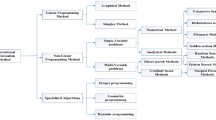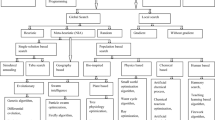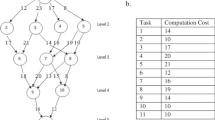Abstract
In the modern business environment, meeting due dates and avoiding delay penalties are very important goals that can be accomplished by minimizing total weighted tardiness. We consider a scheduling problem in a system of parallel processors with the objective of minimizing total weighted tardiness. Our aim in the present work is to develop an efficient algorithm for solving the parallel processor problem as compared to the available heuristics in the literature and we propose the ant colony optimization approach for this problem. An extensive experimentation is conducted to evaluate the performance of the ACO approach on different problem sizes with the varied tardiness factors. Our experimentation shows that the proposed ant colony optimization algorithm is giving promising results compared to the best of the available heuristics.
Similar content being viewed by others
References
Abdul-Razaq TS, Potts CN (1988) Dynamic programming state-space relaxation for single machine scheduling. J Oper Res Soc 39:141–152
Abdul-Razaq TS, Potts CN, Van Wassenhove LN (1990) A survey of algorithms for the single machine total weighted tardiness scheduling problem. Discrete Appl Math 26:235–253
Akturk MS, Yildirim MB (1998) A new lower bounding scheme for the total weighted tardiness problem. Comput Oper Res 25:265–278
Alidaee B, Ramakrishnan KR (1996) A computational experiment of COVERT-AU class of rules for single machine tardiness scheduling problem. Comput Ind Eng 30(2):201–209
Alidaee B, Rosa D (1997) Scheduling parallel machines to minimize total weighted and unweighted tardiness. Comput Oper Res 24(8):775–788
Arkin EM, Roundy RO (1991) Weighted-tardiness scheduling on parallel machines with proportional weights. Oper Res 39(1)
Avci S, Akturk MS, Storer RH (2003) A problem space algorithm for single weighted tardiness problems. IIE Trans 35:479–486
Babu P, Peridy L, Pinson E (2004) A branch and bound algorithm to minimize total weighted tardiness on a single processor. Ann Oper Res 129:33–46
Balasubramanian H, Mönch L, Fowler J, Pfund M (2004) Genetic algorithm based scheduling of parallel batch machines with incompatible job families to minimize total weighted tardiness. Int J Prod Res 42(8):1621–1638
Bauer A, Bullnheimer B, Hartl RF, Strauss C (2000) Minimizing total tardiness on a single machine using ant colony optimization. Cent Eur J Oper Res Econ 8(2):125–141
Bonabeau E, Dorigo M, Theraulaz G (2000) Inspiration for optimization from social insect behaviour. Nature 406:39–42
Chan FTS (2004) Impact of operation flexibility and dispatching rules on the performance of a flexible manufacturing system. Int J Adv Manuf Technol 24:447–459
Chan FTS, Chan HK, Kazeroon A (2002) A fuzzy multi-criteria decision-making technique for evaluation of scheduling rules. Int J Adv Manuf Technol 20(2):103–113
Cheng TCE, Sin CCS (1990) A state-of-the-art review of parallel-machine scheduling research. Eur J Oper Res 47:271–292
Coello Coello CA (2002) Theoretical and numerical constraint-handling techniques used with evolutionary algorithms: a survey of the state of the art. Comput Methods Appl Mech Eng 191:1245–1287
Colorni A, Dorigo M, Maffoli F, Maniezzo V, Righini G, Trubian M (1996) Heuristics from nature for hard combinatorial optimization problems. Int Trans Oper Res 3(1):1–21
Congram RK, Potts CN, van de Velde SL (2002) An iterated dynasearch algorithm for the single-machine total weighted tardiness scheduling problem. INFORMS J Comput 14(1):52–67
Cordón O, Herrera F, Stützle T (2002) A review on the ant colony optimization metaheuristic: basis, models and new trends. Mathw Soft Comput 9
Crauwels HAJ, Potts CN, Van Wassenhove LN (1998) Local search heuristics for the single machine total weighted tardiness scheduling problem. INFORMS J Comput 10(3)
Dorigo M, Stützle T (2005) Ant Colony Optimization. Prentice-Hall of India Pvt. Ltd
Ergun O, Orlin JB (2006) Fast neighborhood search for the single machine total weighted tardiness problem. Oper Res Lett 34:41–45
Fisher ML (1976) A dual algorithm for the one-machine scheduling problem. Math Program 11:229–251
Gagné C, Price WL, Gravel M (2002) Comparing an aco algorithm with other heuristics for the single machine scheduling problem with sequence-dependent setup times. J Oper Res Soc 53:895–906
Lawler EL (1977) A pseudopolynomial algorithm for sequencing jobs to minimize total tardiness. Ann Discrete Math 1:343–362
Lawler EL (1979) Efficient implementation of dynamic programming algorithms for sequencing problems. Tech. Rep. Report BW 106, Mathematisch Centrum, Amsterdam
Lee ZJ, Lee CY, Su SF (2002) An immunity-based ant colony optimization algorithm for solving weapon-target assignment problem. Applied Soft Computing 2:39–47
Liao CJ, Juan HC (2007) An ant colony optimization for single-machine tardiness scheduling with sequence-dependent setups. Comput Oper Res 34:1899–1909
Maheswaran R, Ponnambalam SG, Aravindan C (2005) A meta-heuristic approach to single machine scheduling problems. Int J Adv Manuf Technol 25:772–776
Merkle M, Middendorf M, Schmeck H (2000) Pheromone evaluation in ant colony optimization. Tech. rep., Institute for Applied Computer Science and Formal Description Methods, University of Karlsruhe, Germany
Pinedo M (1995) Scheduling: theory, algorithms, and systems. Prentice-Hall, New Jersy
Potts CN, Van Wassenhove LN (1985) A branch-and-bound algorithm for the total weighted tardiness problem. Oper Res 33(2):363–377
Potts CN, Van Wassenhove LN (1991) Single machine tardiness sequencing heuristics. IIE Trans 23(4):346–354
Rachamadugu RMV (1987) A note on the weighted tardiness problem. Oper Res 35:450–451
Rajendran C, Ziegler H (2004) Ant-colony algorithms for permutation flowshop scheduling to minimize makespan/total flowtime of jobs. Eur J Oper Res 155:426–438
Ritchie G (2003) Static multi-processor scheduling with ant colony optimisation & local search. Master’s thesis, Artificial Intelligence School of Informatics, University of Edinburgh
Schrage L, Baker KR (1978) Dynamic programming solution of sequencing problems with precedence constraints. Oper Res 26:444–449
Sen T, Sulek JM, Dileepan P (2003) Static scheduling research to minimize weighted and unweighted tardiness: a state-of-the-art survey. Int J Prod Econ 83:1–12
Stützle T, den Besten M, Dorigo M (1999) Ant colony optimization for the total weighted tardiness problem. Tech. Rep. IRIDIA/99–16, Université Libre de Bruxelles, Brussels, Belgium
Szwarc W, Liu JJ (1993) Weighted tardiness single machine scheduling with proportional weights. Manage Sci 39:626–632
Talbi EG, Rouxb O, Fonlupt C, Robillard D (2001) Parallel ant colonies for the quadratic assignment problem. Future Gener Comput Syst 17:441–449
Tasgetiren MF, Sevkli M, Liang YC, Gencyilmaz G (2004) Particle swarm optimization algorithm for single machine total weighted tardiness problem. In: Evolutionary computation, 2004. CEC2004. Congress on, vol 2, pp 1412–1419
T’kindt V, Monmarché N, Tercinet F, Laügt D (2002) An ant colony optimization algorithm to solve a 2-machine bicriteria flowshop scheduling problem. Eur J Oper Res 142:250–257
Ying KC, Liao CJ (2003) An ant colony system approach for scheduling problems. Prod Plan Control 14:68–75
Ying KC, Liao CJ (2004) An ant colony system for permutation flow-shop sequencing. Comput Oper Res 31:791–801
Author information
Authors and Affiliations
Corresponding author
Rights and permissions
About this article
Cite this article
Raghavan, N.R.S., Venkataramana, M. Parallel processor scheduling for minimizing total weighted tardiness using ant colony optimization. Int J Adv Manuf Technol 41, 986–996 (2009). https://doi.org/10.1007/s00170-008-1544-z
Received:
Accepted:
Published:
Issue Date:
DOI: https://doi.org/10.1007/s00170-008-1544-z




